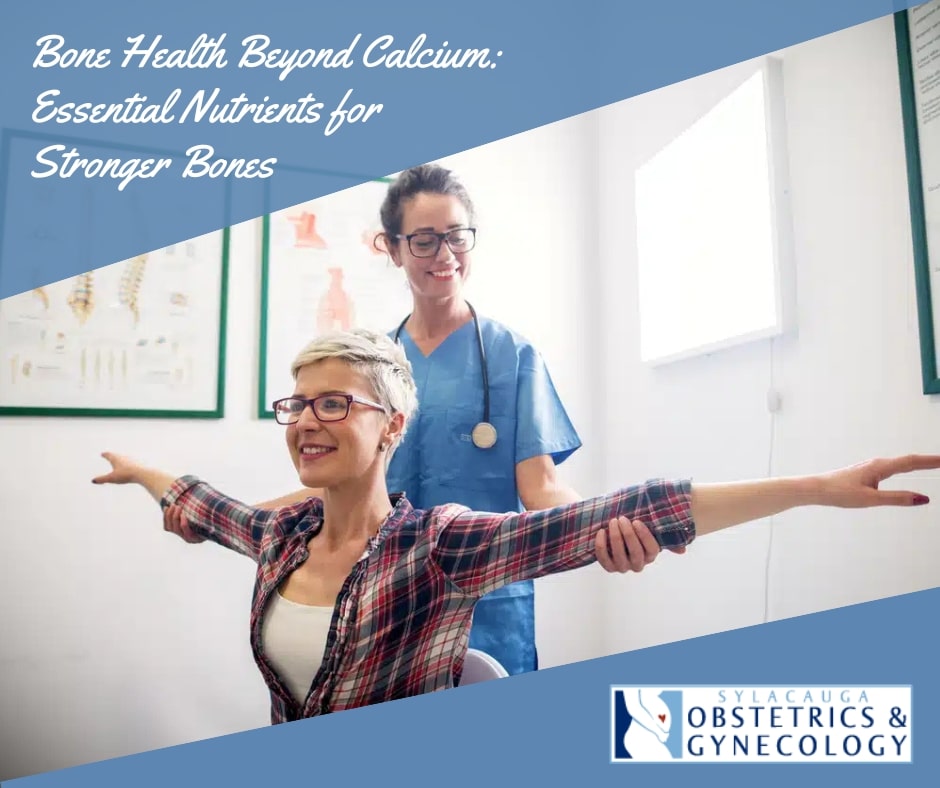
20 Sep Bone Health Beyond Calcium: Essential Nutrients for Stronger Bones
Bone health is an important part of every woman’s well-being at every stage of life. Strong bones support your body, protect your organs, and even help produce blood cells. But to keep your bones in top shape, you need the proper nutrients. Today, Sylacauga OB-GYN is exploring the essential nutrients you need for stronger bones. We’ll explain why certain minerals, vitamins, and protein make all the difference for your skeleton and tell you the best ways to ensure you get enough of them.
Essential Minerals for Bone Strength
A mineral is an essential element found in food that the body requires to function properly. To build and maintain strong bones, certain minerals play a crucial role:
Calcium
Calcium is the poster child for bone health. It’s the main ingredient in your bones, making up about 99% of your body’s calcium stores. But calcium doesn’t just make up bones – it’s also essential for your muscles, heart, and nerves to function correctly.
You need calcium from your diet or supplements because your body can’t produce it on its own. The recommended daily intake for women over 51 is 1,200 milligrams (mg), while men in the same age group should aim for 1,000 to 1,200 mg.
The good news is that you can find calcium in lots of tasty foods. Dairy products like milk, cheese, and yogurt are excellent sources. But if you don’t eat dairy, don’t worry. You can also get your calcium fix from nuts, seeds, beans, leafy greens, fruits, and seafood.
Phosphorus
Phosphorus is the second most important mineral for bone health and the second most abundant mineral in your body. About 85% of your body’s phosphorus is stored in your bones and teeth.
This mineral is a multitasker – it’s involved in many biological processes, helps maintain your body’s acid-base balance, and is a key component of essential compounds like ATP and ADP. Phosphorus works with calcium to form hydroxyapatite crystals, giving your bones rigidity.
Zinc
Zinc might be a trace element, but it’s necessary for bone health. It’s essential for the function of several critical enzymes in osteoblasts, the cells responsible for building new bone tissue. Zinc also plays a role in collagen synthesis, which is crucial for bone formation.
Crucial Vitamins for Bone Health
Vitamin D
When sunlight hits your skin, your body starts producing vitamin D, a key hormone for bone health. Vitamin D helps your body absorb calcium from your gut and regulates the levels of calcium and phosphorus in your blood—both of which are essential for building strong bones. Without enough vitamin D, you might be at risk for conditions like osteomalacia (soft bones) or osteoporosis (weak, brittle bones).
Vitamin K
Vitamin K is like a conductor, telling specific proteins in your body what to do. It activates proteins involved in bone formation and mineralization (the process that makes your bones strong). Some studies have found that not getting enough vitamin K might lead to lower bone density and a higher risk of fractures
This vitamin comes in two forms: K1 and K2. K1 is found in green leafy veggies, while K2 is mainly found in fermented foods and some animal products.
Vitamin C
While not as famous for bone health as D and K, vitamin C is still necessary. It’s essential for collagen production, which forms the framework for your bone structure. It also acts as an antioxidant, protecting your bone cells from damage.
These vitamins work best as a team. A balanced diet rich in fruits, vegetables, and healthy fats is your best bet for getting all the bone-boosting nutrients you need. And don’t forget – regular exercise, especially weight-bearing activities, is crucial for maintaining strong, healthy bones.
Protein: Building Blocks for Bones
Keeping track of protein intake might feel reminiscent of bodybuilders and gym rats, but everyone can benefit from ensuring they consume enough protein for bone health. Protein helps to build and maintain strong bones throughout your life:
Importance of Protein
Protein is essential for optimal bone mass gain during growth and for preserving bone and muscle mass as you age. It’s vital if you’re a senior with osteoporosis or at risk of malnutrition due to illness or injury. Adequate protein intake is linked to higher bone mineral density, slower bone loss, and reduced risk of hip fractures.
Recommended Intake
For most adults, the recommended daily allowance (RDA) for protein is 0.8 g per kg of body weight. However, you might need more if you’re over 65 or have osteoporosis. Some experts suggest aiming for at least 0.8 g/kg body weight per day, which is above the current RDA.
Best Protein Sources
Protein can be obtained from both animal and plant sources. Good animal sources include dairy foods, meat, poultry, fish, and eggs. If you’re looking for plant-based options, try legumes (like lentils and kidney beans), soy products (like tofu), grains, nuts, and seeds.
Keeping Your Bones Strong For Years to Come
Maintaining strong bones is a lifelong journey. It’s a balance of getting all of the essential minerals, vitamins, and protein you need and making lifestyle choices. Small changes in your daily habits can have a big impact on your bone health over time. Every step counts, whether it’s adding more calcium-rich foods to your diet, spending a few minutes in the sun for vitamin D, or upping your protein intake.
To ensure your bone health is on the right track, it’s a good idea to check in with a healthcare professional. Schedule an appointment at Sylacauga OB-GYN to discuss your bone health and get personalized advice on how to keep your bones strong and healthy for years to come.
Prioritize Your Health with Sylacauga OB-GYN: Expert Care for Every Stage of Womanhood
At Sylacauga OB-GYN, our mission is to empower women with the care and support they deserve at every stage of life. We’ll help you take charge of your health and well-being with personalized treatments and compassionate care. Make an appointment with Sylacauga OB-GYN today and take the first step toward a healthier, happier you! You can schedule your consultation by contacting us online or calling us at (256) 510-7163.


